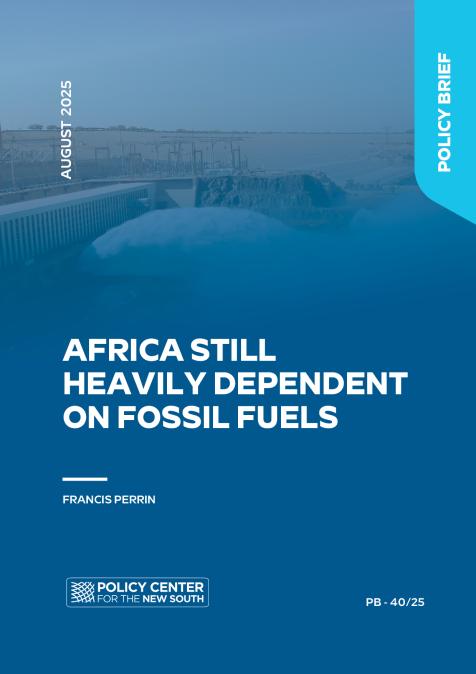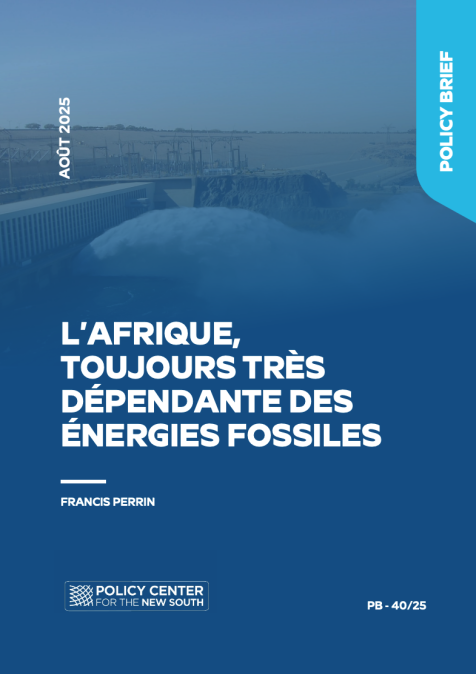Publications /
Policy Brief
The publication of the latest (74th) edition of the Statistical Review of World Energy (SRWE, 2025) is a good opportunity to take stock of some major trends in the world of energy. In this note, we focus on the African continent. All figures below are taken from this document and refer to the year 2024, unless otherwise indicated.
SRWE figures relate to commercially-traded energies, which include fossil fuels, hydroelectricity, nuclear power and modern renewable energies other than hydroelectricity that are used to generate electricity, such as wind and solar power. These data therefore underestimate Africa's energy consumption, since some renewable energies (wood, biomass) do not always pass through commercial channels.
For several decades, SRWE was the BP Statistical Review of World Energy. The British group withdrew from this project three years ago, but continues to support it. For the third year running, SRWE is published by the Energy Institute (London) in collaboration with Kearney and KPMG.
FOSSIL FUELS: NEARLY 95% OF AFRICA'S ENERGY CONSUMPTION
It's no secret that we are heavily dependent on fossil fuels (oil, coal and natural gas), which naturally has a major impact on greenhouse gas emissions. It is generally estimated that these energies account for around 80% of global consumption. According to SRWE, their share of total energy supply was almost 87% last year. Hydrocarbons (oil and gas) accounted for 58.7% in 2024. But for Africa, the corresponding figures were 94.5% (fossil fuels) and 74% (hydrocarbons), almost eight points and over 15 points respectively above world averages, which is considerable. The world is therefore not close to being able to do without fossil fuels, and this is even truer for Africa. Oil, still the world's leading energy source, accounted for 33.6% of global energy demand in 2024. For Africa, it was 43.5%, ten points higher than the global figure.
IN 2024, AFRICA REPRESENTED ONLY 3.5% OF GLOBAL ENERGY DEMAND
The very high share of fossil fuels in Africa's energy demand is one of the continent's major specificities. Unsurprisingly, another key factor is the region's very low share of global energy demand. According to SRWE, this was just 3.5% in 2024, despite the fact that Africa accounts for around 20% of the world's population. These two percentages speak volumes about the continent's state of development. But it gets worse. This share has barely budged in ten years, since it was estimated at 3.3% in 2014. Africa's energy demand, however, increased by just over 20% over the period 2014-2024, representing an average annual growth rate of 1.9%. Four countries - South Africa, Egypt, Algeria and Morocco - alone accounted for 59% of the continent's total energy demand.
Last year, Africa's per capita energy demand was no more than 19% of global per capita demand, and less than 9% of that of OECD countries (Organisation for Economic Co-operation and Development, Paris). And here again, there's more bad news. Over the last ten years, the continent's per capita demand has fallen by 0.6% per year, while global demand has risen by 0.3% per year over the same period. In 2014, Africa's energy demand per capita represented 20.8% of the world average (19.1% in 2014). This trend reflects the continent's strong demographic growth.
MANY AFRICAN COUNTRIES ARE NOT WILLING TO ABANDON FOSSIL FUELS, ESPECIALLY HYDROCARBONS
There are very close links between economic development, energy consumption and greenhouse gas emissions. As mentioned above, Africa accounts for just 3.5% of global energy demand. Last year, it generated 3.9% of total energy-related CO2 emissions.
These emissions have risen by 1.4% per year over the last ten years (+0.8% for the world total). It's therefore easy to understand why many African countries are not prepared to say goodbye to fossil fuels, particularly hydrocarbons (coal production is highly concentrated in southern Africa, especially South Africa, while oil and/or natural gas production is widespread across the continent. Moreover, Africa's consumption of hydrocarbons is 3.6 times greater than its consumption of coal). Several of them have significant or very significant fossil resources; Africa's per capita energy consumption is very low; the continent's development will require it to produce and consume much more energy; this region of the world contributes very little to climate change; and several countries belong to intergovernmental organizations or coalitions that defend hydrocarbons, such as OPEC (Organization of the Petroleum Exporting Countries - Algeria, Libya, Nigeria, Gabon, Republic of Congo and Equatorial Guinea), OPEC+ (the same plus Sudan and South Sudan), the Gas Exporting Countries Forum (GECF - Algeria, Egypt, Equatorial Guinea, Libya and Nigeria plus, as observers and non-members, Angola, Mauritania, Mozambique and Senegal) and APPO (African Petroleum Producers’ Organization, 18 member countries).
Africa's share of global oil production did not exceed 7.5% in 2024
If we look at Africa's situation by energy source, two elements are particularly striking: Africa's share of production is quite low, with a maximum of just under 8%; and this share is higher than the continent's share of energy consumption. In terms of production, Africa's share of world oil production was highest in 2024, at 7.5%, according to the same source. For natural gas and coal, the corresponding figures were 5.8% and 2.9% respectively. For electricity generation, the continent's share was 3.1%. In short, Africa weighs very little in global energy production, despite abundant resources that are largely under-exploited.
A MUCH LOWER SHARE OF RENEWABLES IN ELECTRICITY GENERATION THAN AT THE GLOBAL LEVEL
For oil, the continent's production was 7.29 million barrels per day (Mb/d) in 2024, compared with 8.2 Mb/d in 2014. Over this period, the evolution was -1.2% per year, while global production was growing. In contrast, Africa's gas production grew by 1.8% per year over 2014-2024, reaching 240 billion cubic meters last year. Coal production fell by 0.4% a year over the same period to 267 million tonnes in 2024. Electricity generation increased at a good pace (+2.3% per year) between 2014 and 2024, reaching 964 TWh last year. The weight of fossil fuels in Africa is, once again, major, since the overall share of natural gas (412.2 TWh), coal (244.6 TWh) and oil (63.4 TWh) in power generation in Africa was 74.7% in 2024, compared with 58.6% worldwide. Coal and gas were far ahead of hydroelectricity (170.1 TWh) and other renewable energies (60.7 TWh). Nuclear power was virtually absent with 7.8 TWh, and that was only in South Africa. For all renewable energies (including hydroelectricity), Africa's share of global electricity generation was just 2.4%, despite the continent's considerable potential in terms of renewable energies. But, between the existence of resources and their exploitation, there are several indispensable stages, one of which is the ability to finance very heavy investments. And this is not Africa's strong point. It's worth noting, however, that according to SRWE, Kenya is one of the ten countries in the world with the highest ratio of renewable energies to energy consumption, seventh in this case thanks to geothermal energy.
The region's refining capacity was 3.49 Mb/d in 2024 (+0.4% p.a. 2014-2024), representing just 3.3% of the world total. The continent's share of world refining is well below its share of world oil production (7.5%). On one point, Africa is close to the 10% threshold: liquefied natural gas (LNG) exports. These totaled 51.2 billion cubic meters last year (+0.4% per annum over the last ten years), or 9.4% of global LNG exports. The main LNG exporters in Africa are Nigeria and Algeria. Other exporters include Angola, Mozambique, Egypt, Equatorial Guinea, Cameroon and the Republic of Congo (from early 2025, Senegal and Mauritania have been added to the list). That said, African LNG exports have been declining in recent years, reaching 61.6 billion cubic meters in 2019. The 2024 level is the lowest since 2016.
AFRICA "SECURES" A LITTLE MORE OF 4% OF WORLD OIL AND GAS CONSUMPTION
If Africa's share of global energy production is small, its share of global energy consumption is even smaller. For hydrocarbons, it was 4.3%-4.4% in 2024. Its oil consumption (liquids) was 4.56 Mb/d last year (4.4% of the world total). Over the period 2014-2024, it grew by 1.3% a year, slightly faster than global consumption (+1.1% a year). For natural gas, growth in African consumption has been strong, at +4% per year over the last ten years. With 178 billion cubic meters in 2024, it represented 4.3% of global consumption. The corresponding figure for coal was just 2.6%. But, as pointed out above, the production and consumption of this fossil fuel are highly concentrated geographically in Africa. Last year, South Africa alone accounted for almost 82% of the continent's coal consumption.
ENERGY, MINERALS AND METALS
Finally, Africa is well placed in terms of reserves and production of key minerals and metals for the energy sector. The Democratic Republic of Congo, with its considerable mining potential, is a cobalt giant, with 74% of world production in 2024, and controlled 14.6% of copper production. South Africa (35.2%) and Gabon (21.9%) together accounted for around 57% of global manganese production. For lithium, Zimbabwe controlled 9% of world production. And for natural graphite, Madagascar and Mozambique's shares of global production were 5.1% and 2% respectively. But one of the key questions for the future is whether the countries concerned will be able to make the most of these resources in an international context in which the major powers will attempt to control strategic and/or critical minerals and metals for the energy transition, but also for the digital and defense sectors.









